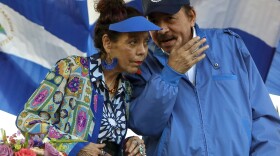
Carrie Kahn
Carrie Kahn is NPR's International Correspondent based in Mexico City, Mexico. She covers Mexico, the Caribbean, and Central America. Kahn's reports can be heard on NPR's award-winning news programs including All Things Considered, Morning Edition and Weekend Edition, and on NPR.org.
Since arriving in Mexico in the summer of 2012, on the eve of the election of President Enrique Peña Nieto and the PRI party's return to power, Kahn has reported on everything from the rise in violence throughout the country to its powerful drug cartels, and the arrest, escape and re-arrest of Joaquin "El Chapo" Guzman. She has reported on the Trump Administration's immigration policies and their effects on Mexico and Central America, the increasing international migration through the hemisphere, gang violence in Central America and the historic détente between the Obama Administration and Cuba.
Kahn has brought moving, personal stories to the forefront of NPR's coverage of the region. Some of her most notable coverage includes the stories of a Mexican man who was kidnapped and forced to dig a cross-border tunnel from Tijuana into San Diego, a Guatemalan family torn apart by President Trump's family separation policies and a Haitian family's situation immediately following the 2010 earthquake and on the ten-year anniversary of the disaster.
Prior to her post in Mexico, Kahn was a National Correspondent based in Los Angeles. She was the first NPR reporter into Haiti after the devastating earthquake in early 2010, and returned to the country on numerous occasions to continue NPR's coverage of the Caribbean nation. In 2005, Kahn was part of NPR's extensive coverage of Hurricane Katrina, where she investigated claims of euthanasia in New Orleans hospitals, recovery efforts along the Gulf Coast and resettlement of city residents in Houston, Texas.
She has covered hurricanes, the controversial life and death of pop icon Michael Jackson and firestorms and mudslides in Southern California,. In 2008, as China hosted the world's athletes, Kahn recorded a remembrance of her Jewish grandfather and his decision to compete in Hitler's 1936 Olympics.
Before coming to NPR in 2003, Kahn worked for NPR Member stations KQED and KPBS in California, with reporting focused on immigration and the U.S.-Mexico border.
Kahn is a recipient of the 2020 Cabot Prize from Columbia Journalism School, which honors distinguished reporting on Latin America and the Caribbean. In 2010 she was awarded the Headliner Award for Best in Show and Best Investigative Story for her work covering U.S. informants involved in the Mexican Drug War. Kahn's work has been cited for fairness and balance by the Poynter Institute of Media Studies. She was awarded and completed a Pew Fellowship in International Journalism at Johns Hopkins University.
Kahn received a bachelor's degree in biology from UC Santa Cruz. For several years, she was a human genetics researcher in California and in Costa Rica. She has traveled extensively throughout Mexico, Central America, Europe and the Middle East, where she worked on an English/Hebrew/Arabic magazine.
-
Cuba is hoping more tourists return to the island. The economy depends on it.
-
Mexico marks a grim milestone: The number of people officially listed as disappeared now exceeds 100,000. Many are victims of drug cartels, journalists, human rights advocates and Indigenous people.
-
After making the cryptocurrency legal tender, President Nayib Bukele plans to launch bitcoin-backed bonds to raise $1 billion for the country.
-
Hondurans celebrated as former President Juan Orlando Hernández, who left office last month, appeared in court to face an extradition request from the U.S.
-
El Salvador's national soccer team plays its World Cup qualifying match against Canada Wednesday night — with several players and coaches from the United States.
-
Thousands of Haitian migrants who had lived in South America for years are crossing into Mexico, overwhelming that country's capacity to process them. Many say their ultimate destination is the U.S.
-
Nicaraguan President Daniel Ortega is running for a fourth consecutive term to remain leader of the Central American country in elections that critics and U.S. officials have labeled a "sham."
-
U.S. border agents are allowing some Haitian migrants into the country on a temporary basis, while others are being deported or heading back over the border to Mexico.
-
Schools in Haiti's southwest are beginning the new school year, just weeks after an earthquake devastated the region.
-
Hundreds of churches in the quake zone were damaged or destroyed. Services have resumed in many places, but rebuilding will be a lengthy process.









